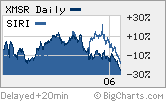|
Satellite radio falls from lofty orbit
Shares of Sirius and XM have taken a tumble so far this year. Are they worth tuning into now?
NEW YORK (CNNMoney.com) - Satellite radio stocks are slowly descending back to earth this year, despite the presence of the radio industry's biggest star. Shock jock Howard Stern made his long-awaited Sirius Satellite Radio (Research) debut on Jan. 9. But that hasn't helped shares of the No. 2 satellite radio company. Shares have plummeted 20 percent so far this year. XM Satellite Radio (Research), the top satellite radio firm, also hasn't benefited from the exposure Stern has brought to the still nascent industry. Its stock has fallen more than 10 percent. But several analysts who follow the two companies think that the recent sell-off is an overreaction. Chad Bartley, an analyst with Pacific Crest Securities, said one reason behind the stocks' recent swoon is the high-profile mess in the automotive sector. "Weakness in the auto market is hurting the stocks," he said. Car manufacturers are big customers for both companies, as many new cars feature satellite radios pre-installed. DaimlerChrysler (Research) and Ford (Research) are key Sirius customers, while XM is aligned with General Motors (Research). Bartley said, however, that both companies should still be able to generate strong subscriber gains from selling radios through retailers, and that the growth rate for each company remains strong. So he thinks investors may have unjustly punished the stocks. "Investors are overly discounting the longer-term opportunity. This is a compelling growth story in media and I still like their longer-term outlook," he said. Sky-high subscriber and sales growth...
Both companies are expected to report their fourth-quarter results later this month and sales growth should be extremely robust. Sirius has already said that it added more than 1.1 million subscribers in the quarter, thanks largely to Howard Stern. Analysts expect sales to have risen by 200 percent to $75 million. Sirius finished the year with more than 3.3 million subscribers. XM already announced that it add about 900,000 subscribers in the fourth quarter and finished the year with just under 6 million total subscribers. Analysts expect sales to have increased 110 percent in the quarter, to $174 million. Thomas Eagan, an analyst with Oppenheimer & Co., wrote in a research note Monday that because there are only two competitors in the industry, he thinks both Sirius and XM will enjoy pricing power for the foreseeable future. As a result, Eagan predicts that revenue growth will outpace subscriber growth by a wide margin for the next few years. And new gadgets that offer consumers a combination of satellite radio and the ability to listen to downloaded music files, such as Sirius' S50 device, could also help boost revenue and subscriber growth, according to Friedman Billings Ramsey analyst Maurice McKenzie. "We expect the combination of live satellite radio, along with MP3 capabilities, to offer an alternative to more popular stand-alone MP3 devices," wrote McKenzie in a recent report about Sirius. ...but plenty of risks remain
But of course, both stocks have been, and probably will continue to be, extremely volatile. Since neither company is expected to generate a profit this year due to the immense start-up costs associated with launching satellites and gaining customers, shares of both companies tend to move more on news about subscriber and sales growth. And piracy could become a bigger concern for both companies. To that end, there have already been reports that some people are illegally broadcasting Stern's show on the Web and on unclaimed frequencies on regular radio. But Bartley maintains that satellite radio piracy won't have a significant financial impact on either company. The two stocks are also favorite targets of short-sellers, investors who bet that a company's stock will go down. As of mid-January, nearly 9 percent of Sirius' available shares were being held by short sellers and more than 20 percent of XM's stock was held by shorts. But one analyst points out that the bearish sentiment is nothing new. "People have been betting against them for a long time," said Greg Gorbatenko, an analyst with Jackson Securities. "This backslide is just something to take advantage of. There is substance to these companies." FORTUNE's Andy Serwer isn't a fan of Sirius stock. Click here for more. For a look at Howard Stern's "Sirius" stock payout, click here.
Analysts quoted in this story do not own shares of the companies mentioned and their firms have no investment banking ties to the companies. |
|




